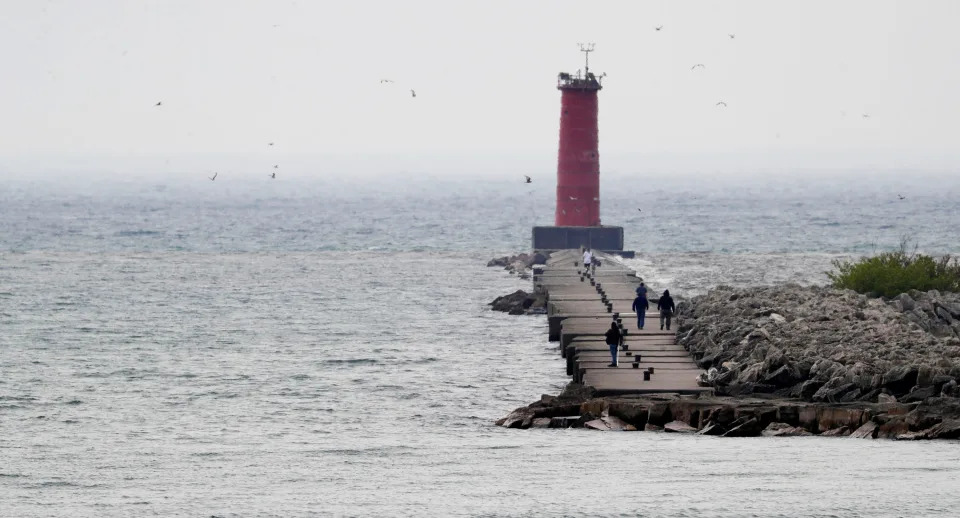USA Today
Startup aims to convert invasive zebra mussels in Lake Michigan into a renewable product
Alex Garner – January 25, 2023

PLYMOUTH, Wisc.— AntiMussel hopes to mitigate trillions of invasive zebra mussels infiltrating the Great Lakes by harvesting them for use in paper and pharmaceutical products.
The Plymouth, Wisc.-based startup, which has raised nearly $20,000 in funding and placed second at county and regional pitch competitions, will launch a pilot program this spring to remove the mollusk from Lake Michigan.
In a 250-square-meter and 80-foot-deep area, AntiMussel will connect a suction to the lake floor and transport them to shore. Wind speed and water temperature data will also be collected.
AntiMussel hopes to use the abundance of zebra mussels as a renewable resource for calcium carbonate, which is typically processed from limestone into varying products like Tums, white melamine paint and plastic.
Ideally, the company wants to create a renewable calcium carbonate product with a corporate partner.

“I want to skip that 6 to 8 million years of geology that it takes to make limestone and instead remove the mussels from the lake where we don’t want them, process them, and we end up with a ground calcium carbonate material that is exactly what is being sold on the market now,” Tyler Rezachek, AntiMussel founder and U.S. veteran, said.
Subscriber exclusive: It’s mid-January and the Great Lakes are virtually ice-free. That’s a problem.
Participating in the pitch competitions helped Rezachek connect with University of Wisconsin-Milwaukee professors, who will take him along on a research boat this spring to study zebra mussels, too.
“I was really kind of an entrepreneur in search of a problem,” Rezachek said about starting AntiMussel. “And zebra mussels (have) been something that I’ve heard about my whole life but never heard anything else about other than how to stop them from spreading.”
Zebra mussels were likely brought to the Great Lakes from Europe and Asia via ship ballast water in the 1980s. Since then, they’ve completely invaded the region and have riddled waterways feeding into the Mississippi River and western states Texas and California, according to the U.S. Geological Survey.
They negatively impact ecosystems in several ways, like outcompeting and incapacitating native mussel and other aquatic species.
Additionally, a female zebra mussel can release up to 1 million eggs per year once reaching reproductive age of two, according to the National Parks Service.
Not much can be done to remove them once a large population has invaded a lake or river.
“At this point, they’re so well established that I could have boats out there sucking zebra mussels all day every day and probably never put a dent in the population,” he said.
Today, an estimated 300 to 750 trillion zebra mussels are in the Great Lakes.
Zebra mussels can also overwhelm commercial, agricultural, forestry and aquaculture industries in the state, according to the Wisconsin Department of Natural Resources.
They also burden taxpayers.
According to some estimates, broad removal and resulting increases in water bills can cost taxpayers up to $1.5 billion a year.
Rezachek said only 3% of the costs is dedicated to preventing further spread.
According to Rezachek, efforts to get rid of zebra mussels center on taking them off infrastructure, like applying chemicals or pressure washing, rather than completely removing them from the water.
“None of those solutions stop mussels from reproducing or remove the resulting shell,” he said. “They just push them away.”

The remaining shells wash onto beaches.
“We can’t walk on a lot of beaches on Lake Michigan now because they’re covered in mussel shells, and they’re razor sharp and they’ll cut your feet and your dog’s feet,” Rezachek said. “And they’re just going to keep collecting there, and the waves just keep pushing them on the beaches. So, unless we remove those in mass, we can never make beaches reusable for people again.”
Heavily infested water bodies like Lake Michigan are beyond the point for a complete elimination of zebra mussels, but there is still hope for smaller lakes.
While AntiMussel will focus on the Great Lakes, it also hopes to conduct customer surveys to see if landowners across the state need zebra mussel clean-ups on private beaches or in lakes.
“The smaller lakes that maybe only have a few thousand mussels in them, they’re not lost,” Rezachek said. “We can get those back and eliminate the mussels there, but then we have to stop them from getting there.”
To help prevent the spread, the National Parks Service suggests boaters drain boats, motors and livewells (circulating tank) before leaving an area of water, wash boats and trailers, and let them dry for at least five days before taking the boat out again because zebra mussels, dependent on water currents and transportation, can infest boat motors and livewells.
